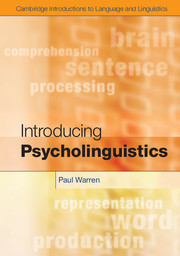Book contents
- Frontmatter
- Contents
- Figures
- Tables
- Preface
- Chapter 1 Introduction
- Chapter 2 Planning utterances
- Chapter 3 Finding words
- Chapter 4 Building words
- Chapter 5 Monitoring and repair
- Chapter 6 The use of gesture
- Chapter 7 Perception for language
- Chapter 8 Spoken word recognition
- Chapter 9 Visual word recognition
- Chapter 10 Syntactic sentence processing
- Chapter 11 Interpreting sentences
- Chapter 12 Making connections
- Chapter 13 Architecture of the language processing system
- Glossary
- References
- Index
Chapter 3 - Finding words
Published online by Cambridge University Press: 05 November 2012
- Frontmatter
- Contents
- Figures
- Tables
- Preface
- Chapter 1 Introduction
- Chapter 2 Planning utterances
- Chapter 3 Finding words
- Chapter 4 Building words
- Chapter 5 Monitoring and repair
- Chapter 6 The use of gesture
- Chapter 7 Perception for language
- Chapter 8 Spoken word recognition
- Chapter 9 Visual word recognition
- Chapter 10 Syntactic sentence processing
- Chapter 11 Interpreting sentences
- Chapter 12 Making connections
- Chapter 13 Architecture of the language processing system
- Glossary
- References
- Index
Summary
PREVIEW
This chapter provides an introduction to how we retrieve words from the mental lexicon (the dictionary in our heads) for production. You will learn that:
patterns of pausing and patterns of speech errors both provide evidence for word selection processes during production;
word finding is affected by the likelihood of a word in a particular context;
some errors indicate competition between alternatives for a word slot in the sentence;
some errors show that words associated with the intended word can interfere with the word finding process.
Introduction
In Chapter 2 we saw that pauses and speech errors are both useful sources of evidence about aspects of the sentence production process. The number and distribution of pauses varies with task complexity and with sentence structure, and can tell us about the amount, type and location of the planning involved in speech production. We also saw that speech errors known as word exchanges, such as (3.1), tend to involve words of the same grammatical category. This indicates that speakers build a sentence frame into which words are positioned according to word-type (e.g. nouns, verbs, etc.).
- Type
- Chapter
- Information
- Introducing Psycholinguistics , pp. 37 - 52Publisher: Cambridge University PressPrint publication year: 2012



